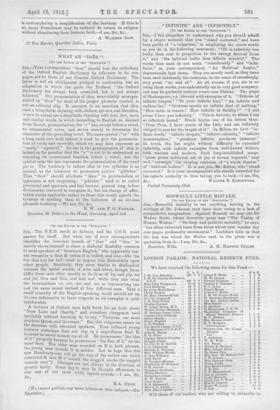WHAT AN "!DER"! [TO TIM Emma or TILE "SrECTATOR.1 SIR, —Your
correspondent " Scot" should test the orthodoxy of the Oxford English Dictionary by reference to its own pages, not to those of our Concise Oxford Dictionary. The latter is not an abridgment pledged to conformity, but an adaptation in which (we quote the Preface) " the Oxford Dictionary has always been consulted, but is not always followed." Our pronunciation of idea, unavoidably misrepre- sented by " Scot" for want of the proper phonetic symbol, is not an editorial slip. It amounts to an assertion that idea, once a trissyllabie rhyming with Judaea, spieaea, and Dorothea, is now in actual use a dissyllable rhyming with beer, fear, mere, and similar words, in which (according to English, as distinct from Scotch, pronunciation) the "r" has, except before a vowel, no consonantal value, and serves merely to determine the character of the preceding vowel. The same symbol ("er" with a long mark over both letters) is used to give the pronuncia- tion of really and agreeable, which we may here represent as "reerly," " agreerbl." Its use in the pronunciation of idea is indeed so far peculiar that the "r" is not to be understood as resuming its consonantal function before a vowel; but the symbol none the less represents the pronunciation of the word per se. The tendency to reduce idea to two syllables is as natural as the tendency to pronounce picture "piktsher." That "Scot" should attribute " ideer" to provincialism or ignorance is not surprising ; " piktsher " used to be called provincial and ignorant, and had become general long before dictionaries ventured to recognize it ; but his charge of affec- tation seems applicable rather to those who would uphold the tyranny of spelling than to the followers of an obvious phonetic tendency.—We are, Sir, &c.,






































 Previous page
Previous page